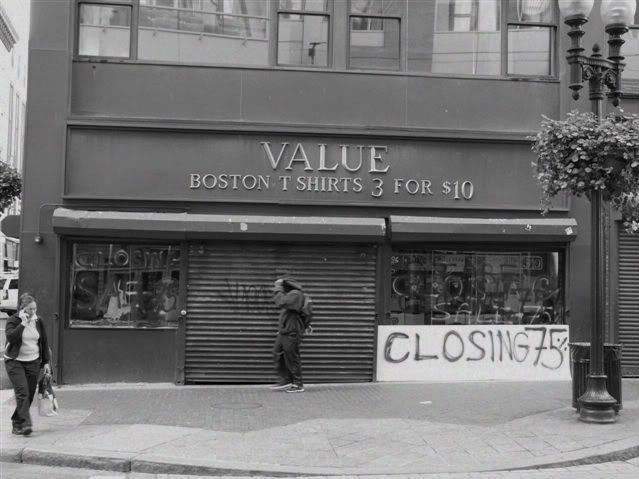A new (but familiar) plan for downtown
By Casey Ross, Globe Staff | November 21, 2008
Mayor Thomas M. Menino and business executives are moving to create a special tax on Downtown Crossing business owners to raise millions of dollars a year to pay for streetscape improvements and other upgrades to the gritty shopping district.
Merchants and commercial property owners in a 20-block area between City Hall and the Theater District would be asked to approve the tax to supplement city services. The money, up to $4 million annually, would go toward a variety of enhancements, including hiring more people to help clean up the area and give directions to tourists and shoppers.
City officials and executives are seeking to create what's known as a business improvement district. They said that it will help soften the ambiance of Downtown Crossing, where vacant storefronts mix with million-dollar condominiums, decades-old jewelry stores, and swank new restaurants.
"This is going to be the new retail area of our city, and its best days are still ahead of it," Menino said. "I'm very bullish on this idea. We have some good leadership in place to make it a reality."
Supporters said the district is critical to efforts to revitalize the neighborhood, especially as economic troubles undermine development projects and efforts to lure new retailers. A $700 million project to redevelop the former Filene's site was put on hold recently because developers could not get construction loans.
"Now more than ever, people need some protection for their investments, to make sure the streets are as clean as they can be," said Rosemarie Sansone, president of the Downtown Crossing Partnership, a business association. "Frankly, Boston should have been the first city in the nation to have a business improvement district."
Instead, it is among the last. Many major cities in the country, from Seattle to Denver to Hartford, have at least one improvement district, and some have multiple designations. New York City used the program to revitalize Times Square, which is now a vibrant eating and shopping area after being known for years as a district more defined by seedy taverns and nightclubs.
Efforts to create an improvement district in Downtown Crossing failed twice in the 1990s because of lack of support. It faced opposition from the Boston Police Patrolmen's Association, a labor union, because of plans to hire private security guards. That idea has been removed in the latest version.
Business executives involved in the current initiative said they are still crafting the exact dimensions of the district and how the tax would be assessed. But they said it has broader support than previous efforts, especially as new residents and businesses begin to move into the area.
There are now 6,000 people living in Downtown Crossing, a sharp increase from the few hundred who lived in the neighborhood in the early 1990s. New restaurants such as Ivy, on Temple Place, are joining with standard-bearers such as Locke-Ober to give the neighborhood more options.
Yesterday, Suffolk University and city officials broke ground on the $42 million redevelopment of the Modern Theatre, which will reopen in the fall of 2010 with a new 184-seat black box theater and gallery space, as well as a 12-story dormitory.
Developer Ronald Druker, who owns several buildings in Downtown Crossing, including the Corner Mall, said the district would help create a more unified design, similar to the environment created by the red brick plaza and classic street lighting of Faneuil Hall.
"You walk into Faneuil Hall, and it's something different," Druker said. "It's cleaner, it's brighter, it's better promoted, and that's what we want, so there's a different sense of place in Downtown Crossing."
The effort to create an improvement district remains in preliminary stages. Sixty percent of commercial property owners would have to agree before it could be submitted to the City Council and mayor for approval.
"No one is expecting Downtown Crossing to become Disney World," said John Rattigan, a lawyer for the firm DLA Piper that is coordinating the initiative. "But bringing more attention to bear and more supplemental services can improve the experience for people who live there and work there."
Casey Ross can be reached at
cross@globe.com.

